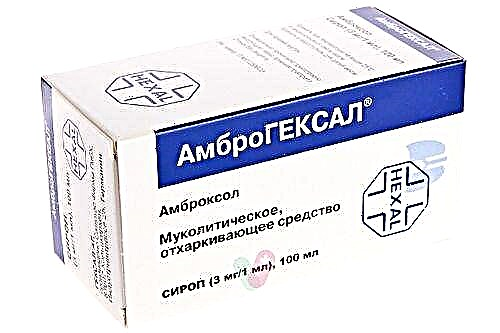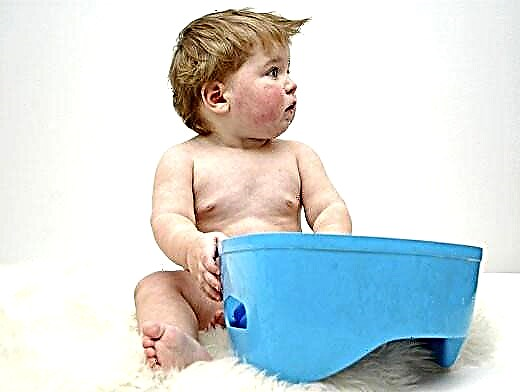
Fish oil has been used as a dietary supplement for over 100 years.
This product is classified as useful, because it provides the human body with fatty acids that are not synthesized in it.
Especially often mothers think about fish oil, wanting to give their babies everything that is most useful and necessary for normal growth. But from how many months is it permissible to start giving it, how is it useful for the child's body and which one to choose from those on the market? Let's figure it out.

Benefit
The fat obtained from fish is called the source of such substances valuable for the growing body:
- Essential fatty acids, which are referred to as omega-3 fats, as well as omega-6 acids.
- Oleic fatty acid, which is omega-9 fats.
- Fat-soluble vitamins D and E, as well as vitamin A.
- Phosphorus and iodine, and chlorine, manganese, selenium, iron and other trace elements.
We recommend watching the video of the program "Living Healthy!", Which details all the beneficial properties of fish oil:
Due to this composition, fish oil:
- Helps absorb calcium.
- Prevents the development of rickets.
- Participates in the mineralization of bones and dental tissues.
- Supports the activity of metabolic processes in the body.
- It has a positive effect on the functions of the brain.
- Stimulates the mental development of children.
- Promotes the development of fine motor skills.
- Improves the ability to learn new knowledge.
- Increases perseverance and concentration.
- Reduces intellectual fatigue.
- Protects against the negative effects of stress.
- Stimulates the formation of serotonin, thereby preventing the appearance of depression.
- Lowers blood cholesterol levels.
- Prevents the development of obesity.
- Strengthens the body's defenses.
- By stimulating the synthesis of prostaglandins, it prevents inflammatory reactions, infectious diseases and allergies.
- Improves the condition of mucous membranes and skin.
- It has a positive effect on the functioning of the respiratory system, as well as the digestive tract.
- Promotes faster healing of skin lesions.
- Improves vision by affecting both night vision and color perception.
- Reduces the risk of malignant tumors.

Harm
Despite the many positive effects of fish oil supplements, these drugs have some drawbacks:
- With fish oil supplements, some children develop allergic reaction.
- Fish oil obtained from shark meat, may include harmful substances.
- Baby fish oil supplements may include artificial flavors and sweeteners.
- Exceeding dosages or too long-term use of fish oil can worsen the health of the child.

Indications
It is recommended to include it in the children's diet in such situations:
- As a means for prevention rickets.
- If the child has developmental disorders and growth retardation.
- When the baby has signs of hyperactivity or manifestations attention deficit disorder.
- If a preschooler or schoolchild is found memory impairment and problems remembering information.
- When a child is diagnosed hypomitaminosis D or A.
- If the child is long-term or often has ARVI.
- When allergic reactions.

- If the child has signs depression or disturbed sleep.
- With eye diseases and vision problems.
- If the baby has a congenital heart defect.
- For the prevention of obesity with tendency to be overweight.
- If you want to speed up healing wounds or burns.
- When excessively dry skin, brittle nails and deteriorated hair condition.
- With the aim of prevent colds and acute respiratory infections.
- In the postoperative period.
Any of these situations may be a reason for the appointment of fish oil, but in each specific case, you should first consult a pediatrician, because a large list of beneficial effects does not exclude the presence of contraindications to such an additive.
We advise you to watch a video description of an interesting experiment conducted in the United States, which investigates the effect of taking fish oil on the mental development of school-age children:
Contraindications
Reception is not recommended for:
- Individual intolerance to fish.
- Hyperfunction of the thyroid gland.
- Diseases of the stomachs.
- Hypervitaminosis D or A.
- Exacerbations of such chronic pathologies as pancreatitis or cholecystitis.
- Diabetes mellitus.
- Severe injuries.
- Gallstone disease.
- Liver pathologies.
- Renal failure.
- Reduced blood pressure.
- Increased bleeding.
- Tuberculosis.
- Kidney stone disease.

In the diet of an infant
The appointment of such an additive for babies in the first 12 months of life must necessarily be agreed with a pediatrician. The doctor will take into account the rate of development of the crumbs, overgrowing of fontanelles and other nuances, on the basis of which he will draw conclusions that the baby needs fish oil. It is impossible to give any preparation containing fish oil to an infant who is not yet 1 year old.
It should be noted that children who are fed with their mother's milk, in the first six months of life, need less additional sources of vitamins and healthy fats. The same cannot be said about artificial babies. If a baby fed with formula does not get enough omega-3 and omega-6 fats, it can lead to problems with intellectual development.
In such a situation, the pediatrician will certainly recommend the inclusion of fish oil in the baby's diet, choosing the drug individually, and then determining the required dosage, as well as the duration of the intake. The minimum age at which fish oil is prescribed, doctors call 4 weeks.
Watch the video in which Dr. Komarovsky talks about the use of vitamins contained in fish oil for the prevention of rickets in young children:
Types and how to choose the best
If we talk about natural fat, then we are talking about an oily transparent liquid of yellow color, which has a characteristic smell and taste. Such fat can be obtained from the liver of fish (mainly cod), and from fish carcasses, for example, from tuna or salmon.
The second option is more preferable for children, because it is cold pressed, it is of higher quality and contains the optimal amount of nutrients. The fat obtained from fish liver is practically devoid of omega-3 fats and will give the child too many fat-soluble vitamins, which is why the duration of its intake is limited to 3 months.
Note that Norwegian fat is considered the highest quality, because the seas of Norway are classified as ecologically clean places, and fish from them does not accumulate oil products, heavy metals and other toxins.

Fish oil supplement manufacturers these days offer quality, delicious-tasting foods for kids that little ones enjoy drinking or chewing. Fish oil for children is liquid, packed in capsules, and also hidden in gummies.
Encapsulated fish oil is called the most effective in its healing effect, since such a drug does not come into contact with air and its beneficial properties last longer. The capsules for these supplements can be made from fish gelatin, which only enhances their benefits. However, many young children cannot chew or swallow capsules, so liquid preparations for an early age (up to three years) are very relevant.

When buying fish oil for your child, carefully read the supplement label and manufacturer's description. It is important to pay attention to the following points:
- From what source it is received.
- Are there any quality certificates for the selected additive?
- Is it indicated that the drug is for medical purposes, not food.
- How much omega-3 fats are in the supplement. It is desirable that their concentration is at least 15%.
- What raw material is the shell made of?
- What are the expiration dates.
If you are purchasing liquid fish oil, make sure that the consistency is uniform and that there is no unpleasant odor. When buying a drug for a child in capsules, it is better to stop at small packages, since long-term storage impairs its properties.
Most popular drugs
Among the supplements containing fish oil, the following preparations are most in demand for children:
Moller Kalanmaksaoljy. It is a fruit-flavored liquid fish oil packaged in 250 ml bottles. This supplement from Finland can be given from 6 months of age. The daily dosage of the drug is 5 ml.

Minisun Omega-3 fats and vitamin D. This Finnish preparation is a source of both fish oil (600 mg in each fruit gummy) and vitamin D3 (400 IU in each jelly). It is recommended to give it to babies over two years old, 1 gummy candy a day.

Triomega kids... This is another Finnish supplement that contains fish oil in capsules. Such fruit capsules are prescribed 2-3 pieces per day for children over 5 years old. It is permissible to both swallow them and chew them.

Solgar Goldfish. This fish-shaped chewy oil is made from tuna cold pressed. The product contains no sugar, salt, starch or any artificial additives. The drug is given to children over 4 years of age, 2 chewable tablets per day.

Bite... These capsules from a domestic manufacturer contain Icelandic fish oil and natural flavors. The supplement is prescribed from the age of 3 with indications for taking fish oil. Children under 7 years old are given one capsule twice a day with meals, and at an older age, the number of doses is increased to 3 a day.

Biafishenol for children. Such domestic fish oil is represented by capsules recommended for children over 3 years old. The product is obtained from Icelandic fish (carcasses). Its daily dosage for ages 3-6 is 4 capsules, and for children over six years of age - 8 capsules.

Biocontour... This fish oil for children from the Russian manufacturer PolarPharm is presented with additives with different flavors - strawberry, apple, lemon, orange, raspberry, grapefruit and multifruit. Also in the assortment of this company from Murmansk there is a preparation without flavors. All of these drugs are soft chewable capsules that are approved for use in children three years of age and older. They are made from carcasses of sardines, Atlantic herring and mackerel. Any of the supplements is prescribed at 4-8 capsules per day.

Paulie Kids... This chewy fish oil with raspberry or orange flavor is produced in Murmansk. The drug is recommended for children three years old and older. Its daily dosage is 8 capsules.

Omega-3 from Gummi King. This supplement, which contains lemon, strawberry and orange candies without gelatin, contains fish oil from tuna, and the flavors and colors in such a preparation are only natural. These gummy fish are recommended for children over 2 years old, 2 pieces a day.

Instructions for use
Fish oil is advised to be given to children during feeding. It is usually offered to drink, chew, or swallow during breakfast. If it is a liquid preparation without a sweet taste, it can be used for dressing salads and other dishes for children.
The dosage for each child should be selected together with the pediatrician, because such an additive can be prescribed both for prophylactic purposes and for treatment.
In addition, the dose for a 2 year old or 7 year old child will be different. Liquid fish oil supplements are recommended for children under three, and capsules or jellies can be given for older children.

Fish oil supplements are usually given in a course that lasts 1 to 1.5 months. The drug should be taken daily, and after a break of 2-3 months, it can be repeated. The number of courses per year can be from 1 to 3. It is best to choose the period from September to May for taking such supplements, so that the product does not spoil.
Side effects and overdose
- Taking fish oil on an empty stomach can cause loose stools. To avoid this situation, it is recommended that these supplements are consumed only with meals.
- As for overdose, it is possible if you give your child a liver fat drug. This species contains too many vitamins and can cause nausea, abdominal cramps, and diarrhea. When the drug is discontinued, these side effects disappear.
- Excessive consumption of fat obtained from fish in chronic cholecystitis or pancreatitis can provoke an exacerbation of such pathologies.
- Some children may have bad breath (fish-like).
We recommend watching a BBC movie about the benefits of fish oil for children:
Storage
You cannot store fish oil longer than the manufacturer recommends. Usually the shelf life for such additives does not exceed 24 months, and after opening the package, some drugs should be consumed within 3-4 months.
For the preservation of useful substances, liquid preparations with fish oil are packed in dark glass bottles. Having selected the required dosage of the drug, it is important to close the bottle tightly. If left in the sun, its valuable fatty acids will be destroyed.
Storage at high temperatures will also damage the drug, therefore it is advised to keep fish oil at temperatures below + 10 ° C. For this reason, drugs are not recommended to be taken in the summer.

Komarovsky's opinion
A popular doctor classifies fish oil as a useful supplement, but advises giving it to children and nursing mothers only if it is impossible to get vitamin D from other sources. If the child and his mother regularly walk in sunny weather, take complex vitamins or synthetic vitamin D, Komarovsky does not see the need for it in the diet.
Nevertheless, a well-known pediatrician does not consider such an additive to be harmful, and if the mother wants to give it as an addition to the child's diet, this, according to Komarovsky, will not harm. Provided that the parents discuss the single dose, frequency of administration and duration of use with the pediatrician.
What can be replaced?
Omega fats, vitamin D and other beneficial compounds from fish oil may well be obtained by a child from food. To do this, fish should be present in his diet twice or three times a week. The most valuable species are trout, salmon, mackerel, tuna, haddock, herring and sea bass.
You can also get omega fats from plant foods, for example, from walnuts, vegetable oils, flax seeds and pumpkin seeds... Vitamin D is abundant in products such as butter, eggs, liver, sour cream. If they regularly appear on the child's menu, he will not need an additional intake of fish oil.

Reviews
Most mothers respond positively to fish oil supplements.... They are satisfied with the use of such natural preparations in children, noting the strengthening of immunity, success in learning, strong bones and teeth, and the good mood of the kids.
Among manufacturers, Finnish companies, for example, Meller, receive the most positive reviews. Although the price of drugs from Finland is slightly higher, they attract mothers with their quality and natural composition.
Some toddlers don't like fish oil, even when placed in gummy candy... At the same time, most children do not protest against children's supplements with fish oil, calling them delicious. Children especially like preparations in the form of fish.
Such drugs are tolerated, according to mothers, also generally well.Allergic reactions are rare and mostly in children who are allergic to fish or seafood.

You can learn more about the benefits of fish oil by watching the program "On the most important thing."



